Exploring the Versatility of FIBC Bags: From Loop Designs to UN Certified Solutions

In today’s fast-paced industrial landscape, packaging plays a pivotal role in ensuring product safety, cost-efficiency, and streamlined logistics. Among the most versatile and widely used bulk packaging solutions are FIBC Bags—Flexible Intermediate Bulk Containers. These bulk bags have revolutionized material handling for industries ranging from agriculture to chemicals, construction and more.
FIBC bags offer customizable solutions for bulk storage and transport, with an array of features that make them indispensable in both domestic and international markets. In this blog, we explore the different types of FIBC bags, including 1 & 2 Loop FIBC, 4 Loop FIBC, UN Certified FIBC Bags, and innovative variants like Q Bags, Ventilated Bags, Conductive Bags, Type D Bags, and Dumpster Bags.
What Are FIBC Bags?
FIBC Bags (Flexible Intermediate Bulk Containers) are made from woven polypropylene fabric and are designed to carry dry flowable products in bulk. These bags can typically hold 500 kg to 2000 kg of material and are widely used for transporting powders, granules, and other solid bulk goods. FIBC bags are valued for their:
· Cost-effective bulk packaging
· Reusability and recyclability
· Customizable sizes and specifications
· Compatibility with various industries
From construction debris to food grains, FIBC bags can be tailored to meet specific packaging and transportation requirements.
Types of Loop Designs: 1 & 2 Loop FIBC and 4 Loop FIBC Bags
1 & 2 Loop FIBC Bags
1 & 2 Loop FIBC Bags are commonly used in agricultural and fertilizer industries due to their high strength and simplified handling with forklifts or cranes. These bags are constructed using a single piece of fabric with reinforced lifting loops extending from the body, ensuring better load distribution and minimal stress points.
Key benefits of 1 & 2 loop FIBC bags:
· Suitable for single-point lifting
· Cost-effective for mass production
· Quick and efficient loading/unloading
4 Loop FIBC Bags
4 Loop FIBC Bags are the most versatile and widely used type. They feature four strong loops sewn into each corner of the bag, allowing easy lifting with standard forklifts. These bags are ideal for a wide range of industries, including chemicals, mining, food processing, and construction.
Advantages of 4 loop FIBC bags:
· Superior stability during transport
· Easy to handle and store
· Customizable spouts for filling and discharging
UN Certified FIBC Bags: Safety for Hazardous Goods
For industries dealing with hazardous goods, safety compliance is non-negotiable. UN Certified FIBC Bags are specifically designed and tested to meet the UN’s rigorous safety standards for transporting hazardous materials.
These bags undergo strict testing for:
· Drop resistance
· Top lift and stacking performance
· Tear and rupture strength
UN Certified bags are typically used in chemical, fertilizers, and mining sectors where secure containment is essential for workplace safety and regulatory compliance.
Exploring Specialized FIBC Variants
Q Bags / Baffle Bags
Q Bags, also known as Baffle Bags, are engineered with internal baffles stitched inside the bag to retain a cubical shape even when filled. This design maximizes space utilization in containers or trucks, making them highly efficient for logistics.
Benefits of Q Bags:
· Stackable and space-efficient
· Offers upto 30% more storage
· Minimized bulging or deformation
· Enhanced load stability
These bags are preferred for transporting fine powders, resins, or materials where stability and shape retention matter.
Ventilated FIBC Bags
Ventilated Bags are specifically designed for products that require constant airflow, such as onions, potatoes, firewood, and garlic. These bags have breathable mesh panels that allow air circulation, reducing the risk of moisture buildup and spoilage.
Ventilated FIBC bags offer:
· Extended shelf life for perishable goods
· Prevention of mold and rot
· Cost-effective and reusable design
Conductive Bags (Type C)
Conductive FIBC Bags, or Type C Bags, are used for transporting flammable powders or for operations in explosive environments. These bags are woven with conductive threads that must be grounded during filling and discharging to prevent static electricity buildup.
Use cases:
· Flammable powders
· Dust-prone manufacturing areas
Type D FIBC Bags
Unlike Type C, Type D FIBC Bags (anti-static or dissipative bags) don’t require grounding. They are made from special antistatic fabric that safely dissipates electrostatic charges without any human intervention.
Advantages of Type D Bags:
· Safe handling in flammable or explosive zones
· Eliminates grounding errors
· Ideal for automation-driven warehouses
Dumpster Bags
Dumpster Bags are large FIBC bags used for collecting and transporting construction debris, renovation waste, and heavy-duty scrap materials. These bags are robust, easy to maneuver, and ideal for both residential and commercial construction projects.
Features of dumpster bags:
· Heavy-duty lifting capacity
· Reinforced fabric for sharp and rough materials
· Reusable for multiple waste management cycles
Customization and Applications Across Industries
FIBC Bags are incredibly versatile and can be customized with:
· Coatings and liners for moisture protection
· UV-treated fabric for outdoor use
· Different filling and discharge options
· Printed labeling for branding or regulatory needs
Industries using FIBC bags include:
· Agriculture (grains, seeds, fertilizer)
· Chemicals
· Mining and minerals
· Food processing
· Construction and waste management
Whether it’s a 4 loop FIBC bag for cement, a ventilated FIBC bag for onions, or a UN Certified FIBC bag for hazardous materials, there’s a solution tailored for every need.
Conclusion
The world of FIBC Bags is vast and evolving, thanks to continuous innovations in materials, design, and manufacturing practices. From 1 & 2 Loop FIBC Bags for efficient lifting to UN Certified Bags for hazardous goods, and from Q Bags for optimized storage to Type D Bags for safety in explosive environments—the versatility of FIBCs makes them an irreplaceable asset in modern packaging and logistics.
Choosing the right type of FIBC bag ensures not only efficient material handling but also compliance, safety, and product preservation. As industries push for more sustainable, durable, and tailored packaging options, FIBC bags continue to stand out as the go-to solution for bulk transport challenges.
Looking for Reliable FIBC Bags with Custom Features?
Umasree Texplast is a trusted manufacturer and exporter of high-quality FIBC Bags, including 1 & 2 Loop FIBC, 4 Loop FIBC, UN Certified Bags, Q Bags, Ventilated Bags, Conductive Bags, Type D Bags, and more.
With a commitment to global standards, sustainable production, and customer-centric service, Umasree Texplast ensures you get the right packaging solution every time.
Contact Umasree Texplast today to discuss your custom FIBC bag requirements!





